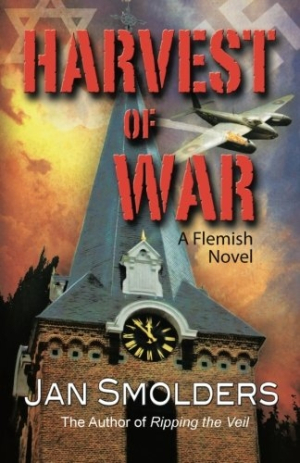Harvest of War
A Flemish Novel
Despite the bleak context and occasional brutality, there’s seldom a sense that the people have been spiritually defeated in this high-stakes WWII novel.
Harvest of War by Jan Smolders portrays a World War II community where neighbors are plagued with doubts about one another, even as those who refuse to despair perform quiet acts of heroism. A suspenseful plot highlights the tension between moral justice and doing whatever it takes, however questionable, to survive.
It is 1944, and Ramsel, Belgium, is occupied by Germans. Divided between Nazi collaborators and members of the resistance, the once close-knit community is rife with rumors. Bruno Van Dam—a brusque, resourceful doctor—is the central figure in this tale of risking one’s own safety for the sake of the more vulnerable. When circumstances force him to hide a Jewish orphan and two British pilots, the high-stakes problems of transporting them play against the ongoing fear of capture. After Van Dam’s own son, Eric, is rounded up by the Germans, Van Dam’s efforts to free him by approaching the enemy roil the town.
An emphasis on action leaves limited room for growth. Despite their ordeals, several characters seem largely unchanged over the course of the book. Characters also tend toward familiar types: an indispensable, faithful housekeeper; an honorable, elderly man who suffers no fools; and a widow whose beauty and independent ways fuel gossip.
Still, Harvest of War is a worthwhile exploration of the period. Belgian perpetrators and victims are both rendered with care; questions of belonging on the right or wrong side of wartime struggles are shaded with complexity. Levelheaded members of the resistance, members on the fringe who give in to violence, uninvolved parties who show their true natures once liberation occurs, ordinary citizens, and unlikely heroes reveal the many ways people contend with extreme pressure.
Especially apt scenes highlight disparities between appearances and reality. A woman whose home is seized by Germans assumes the role of lover and informer to a German officer, yet she remains on the side of the locals, despite few of them realizing it. Van Dam’s longtime friend, Ivan Beckers, is similarly misunderstood. The pain of Eric Van Dam’s absence remains abstract, since prior to his capture his character remained in the background as an example of the town’s youth. A tendency to explain passing thoughts in italics is distracting.
Harvest of War shines for its unexpected optimism. Despite the bleak context and occasional brutality, there’s seldom a sense that the people of Ramsel have been spiritually defeated. Through deep-seated resolve, and for all of their differences, they band together. This is a clear-sighted reminder of life’s shifting tides, and of the necessity of acting with selflessness.
Reviewed by
Karen Rigby
Disclosure: This article is not an endorsement, but a review. The publisher of this book provided free copies of the book and paid a small fee to have their book reviewed by a professional reviewer. Foreword Reviews and Clarion Reviews make no guarantee that the publisher will receive a positive review. Foreword Magazine, Inc. is disclosing this in accordance with the Federal Trade Commission’s 16 CFR, Part 255.

